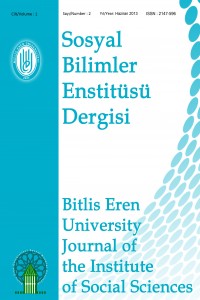Abstract
Language, which can be defined as the systematic usage of expressions within a certain logical pattern, can be separated into dialects, accents and smaller regional accents within it self. Arabic, which is the language of the Holy Quran, can not be excluded from this general principle. The translation of noun phrases شٌشق and شٌشق ٌاسن into Turkish as "Quraishi Dialect" in every context and situation shows that the sebasic difference ara not taken into consideration and still preferred because of general consensual though it is known to be a mistake. How ever the senoun phrases are used sometimes to refer to the dialect, sometimes to the accentands sometimes to the minorlocalaccent, base on the context they werw used with in the Arabic sources
References
- -Kur‟an-ı Kerim
- - Ahmed b. Hanbel, Müsned, DaruSahnun ve Çağrı Yayınları, Tunus&İstanbul, 1992.
- - Aksan, Doğan,Her Yönüyle Dil Ana Çizgileriyle Dilbilim, TDK Yayınları, Ankara, 2009.
- - Ebu Abdullah Muhammed b. Ahmed b. Ebu Bekr el-Kurtubî, el- Câm'iliahkami'l-Kur'ân, (Thk: Abdullah b. Abdulmuhsin et-Turkî), Muessesetu'r- Risâle, Beyrut, 2006.
- - Ebu'l-Feth Osman b. Cinnî, el-Hasâis, thk. M. Ali Neccar, Daru'l- Kutubi'l-Mısriyye, Mısır, trs.
- - el-Feyûmî, el-Misbâhu'l-Munîr, Thk. Abdulazîm eş-Şenâvî, Daru'l- Me'arif, Kahire, Tsz.
- - Furat, Ahmed Suphi, Arap Edebiyatı Tarihi, EFD Yayınları, İstanbul, 1996.
- - el-İsfehânî, Ebu'l-Kasım Huseyn b. Muhammed b. el-Mufaddel er-Râğıb, Kitâbu'l-Mufredât fî Ğarîbi'l-Kur'an, Daru'l-Ma'rife, Beyrut,tsz.
- - İbn-i Manzûr, Lisanu'l-'Arab, Thk. Abdullah el-Kebir, Daru'l-Me'arif. Tsz.
- - el-Kalkaşendî, Subhu’l-‘Aşa, el-Matbaatu‟l-Emiriyye, Kahire, 1913.
- - Kenan Demirayak, Arap Edebiyatı Tarihi -I Cahiliye Dönemi, Fenomen Yay. Ankara, 2009.
- - Mahmud b. Ömer ez-Zemahşerî, el-Fâik fî Ğaribi'l-Hadis, Thk. Muhammed Ebu'l-Fadl ve Ali Muhammed el-Bucâvî, Daru İhyai'l-Kutubi'l- 'Arabiyye, 2. Baskı.
- - Muhsin, Muhammed Salim, el-Muktebes minLehecati’lArabiyyetive’l- Kur’aniyyeti, MuessesetuŞebâbi‟Câmia, İskenderiye, 1986.
- - Nihat M. Çetin, T.D.V. İslam Ansiklopedisi, Arap Maddesi.
- …..Eski Arap Şiiri, Kapı Yayınları, İstanbul, 2011.
- - Ömer Rıza Kehhale, Mu'cemuKebâili'l-Arab, Müessesetu'r-Risâle, Beyrut, 1982, 3. Baskı.
- - Riyad Kerim, Muhammed, el-Muktedeb fî lehecâti'l-'Arab, Mısır, 1996.
- - Sa'duddinMes'ud b. Ömer et-Taftazanî, el-Mutavvel, el-Matbaatu'l- Amire, İstanbul, 1309.
- - http://tr.wikipedia.org/wiki/Sami_dil_ailesi (14.11.2013. 13:59)
- http://www.turkcebilgi.com/soru/13532/dil-anlatim-dersi-icinsive-agiz
- ne-demek, 03.08.2012.
Abstract
Lafızların sistemli ve belli bir mantık örgüsü içinde kullanımı şeklinde tanımlanabilecek olan dil, kendi içinde lehçe, şive ve ağızlara ayrılır. Kur’an-ı Kerim’in dili olan Arapça da bu genel kaideden hariç değildir. Kur’an’ın farklı lehçe ve ağızları kullandığı gerçeğine rağmen ??? ???? veya ???? ???? isim tamlamasının her yerde ve bağlamda “Kureyş Lehçesi” olarak dilimize tercüme edilmesi bu temel farkların nazar-ı dikkate alınmadığını ve bunun bir galat-ı meşhur olarak kullanıldığını göstermektedir. Oysaki bu isim tamlamaları Arapça kaynaklarda bulunduğu bağlamlarda bazen lehçe, bazen şive bazen de ağız anlamında kullanılmıştır.
Keywords
References
- -Kur‟an-ı Kerim
- - Ahmed b. Hanbel, Müsned, DaruSahnun ve Çağrı Yayınları, Tunus&İstanbul, 1992.
- - Aksan, Doğan,Her Yönüyle Dil Ana Çizgileriyle Dilbilim, TDK Yayınları, Ankara, 2009.
- - Ebu Abdullah Muhammed b. Ahmed b. Ebu Bekr el-Kurtubî, el- Câm'iliahkami'l-Kur'ân, (Thk: Abdullah b. Abdulmuhsin et-Turkî), Muessesetu'r- Risâle, Beyrut, 2006.
- - Ebu'l-Feth Osman b. Cinnî, el-Hasâis, thk. M. Ali Neccar, Daru'l- Kutubi'l-Mısriyye, Mısır, trs.
- - el-Feyûmî, el-Misbâhu'l-Munîr, Thk. Abdulazîm eş-Şenâvî, Daru'l- Me'arif, Kahire, Tsz.
- - Furat, Ahmed Suphi, Arap Edebiyatı Tarihi, EFD Yayınları, İstanbul, 1996.
- - el-İsfehânî, Ebu'l-Kasım Huseyn b. Muhammed b. el-Mufaddel er-Râğıb, Kitâbu'l-Mufredât fî Ğarîbi'l-Kur'an, Daru'l-Ma'rife, Beyrut,tsz.
- - İbn-i Manzûr, Lisanu'l-'Arab, Thk. Abdullah el-Kebir, Daru'l-Me'arif. Tsz.
- - el-Kalkaşendî, Subhu’l-‘Aşa, el-Matbaatu‟l-Emiriyye, Kahire, 1913.
- - Kenan Demirayak, Arap Edebiyatı Tarihi -I Cahiliye Dönemi, Fenomen Yay. Ankara, 2009.
- - Mahmud b. Ömer ez-Zemahşerî, el-Fâik fî Ğaribi'l-Hadis, Thk. Muhammed Ebu'l-Fadl ve Ali Muhammed el-Bucâvî, Daru İhyai'l-Kutubi'l- 'Arabiyye, 2. Baskı.
- - Muhsin, Muhammed Salim, el-Muktebes minLehecati’lArabiyyetive’l- Kur’aniyyeti, MuessesetuŞebâbi‟Câmia, İskenderiye, 1986.
- - Nihat M. Çetin, T.D.V. İslam Ansiklopedisi, Arap Maddesi.
- …..Eski Arap Şiiri, Kapı Yayınları, İstanbul, 2011.
- - Ömer Rıza Kehhale, Mu'cemuKebâili'l-Arab, Müessesetu'r-Risâle, Beyrut, 1982, 3. Baskı.
- - Riyad Kerim, Muhammed, el-Muktedeb fî lehecâti'l-'Arab, Mısır, 1996.
- - Sa'duddinMes'ud b. Ömer et-Taftazanî, el-Mutavvel, el-Matbaatu'l- Amire, İstanbul, 1309.
- - http://tr.wikipedia.org/wiki/Sami_dil_ailesi (14.11.2013. 13:59)
- http://www.turkcebilgi.com/soru/13532/dil-anlatim-dersi-icinsive-agiz
- ne-demek, 03.08.2012.
Details
| Primary Language | Turkish |
|---|---|
| Journal Section | Araştırma Makaleleri |
| Authors | |
| Publication Date | December 1, 2013 |
| Published in Issue | Year 2013 Volume: 2 Issue: 1 |


